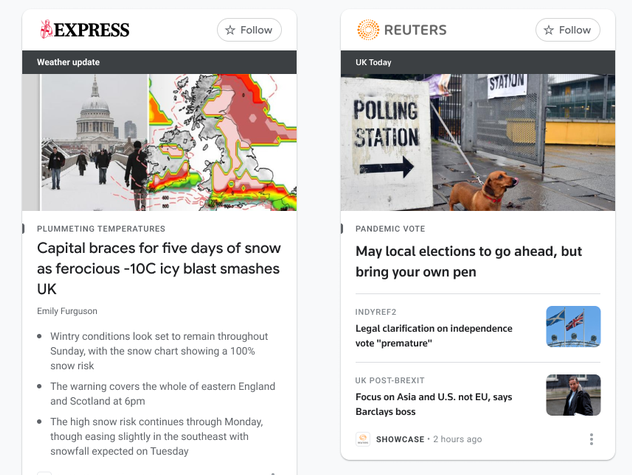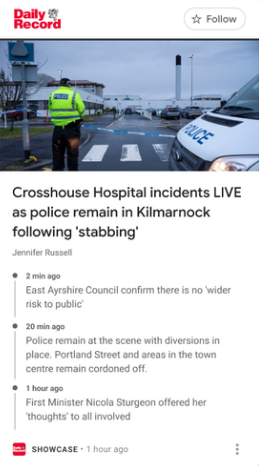
The Google News Showcase programme to pay publishers for content has launched in the UK, two weeks after a similar project went live at Facebook.
The tech giant has signed licensing agreements with a number of publishers that will mean users can see selected paywalled content – more than they would normally see on the newsbrand’s website without signing up.
This aspect has appeared to prove attractive with many of the publishers involved, who are increasingly focused on subscriber metrics and keeping readers engaged.
Participating publishers will have direct control over how their content appears in the news panels, Google said, with editors able to explain stories in their brand’s own voice and bring more context around a link.
Google said it has signed a partnership with the UK’s largest commercial publisher, Reach, which has a network of regional titles plus the Mirror, Express and Star websites.
Other national titles involved in the rollout include the Telegraph, the Independent, Financial Times, Reuters, the Evening Standard and New Statesman.
Chris Taylor, chief operating officer at The Telegraph which has a strategy focused on growing subscriptions, said: “We welcome the registration and subscription sampling opportunities that News Showcase will provide to Google users and we are confident that many of them will go on to become Telegraph subscribers.”

Google News Showcase live panel layout
All the UK’s biggest regional publishers are on board, including Newsquest, JPI Media, Archant, DC Thomson, Iliffe Media, Midland News Association.
DC Thomson head of newspapers Richard Neville said: “…we hope to see new audiences coming to our sites through the partnership.
“We are always looking for innovative ways to increase engagement and expand our ability to attract subscribers and I’m sure this will help us on both counts.”
Google said more than 120 publications in the UK will be curating content for the News Showcase, adding that many are “local newspapers who do not have the same resources that many larger, national papers have to invest in their digital transformation”.
Reach chief audience officer David Higgerson said the company welcomes the potential to give “public interest journalism a more visible platform in Google”.
“For us, public interest journalism thrives when it is not just about recording events but is of genuine interest to the public and is able to attract an audience that means it is sustainable.
“Google’s work here will help give readers a new way to discover news which is important to them, which they may not otherwise have discovered.”
Independent chief executive Zach Leonard added that the scheme will benefit his website’s “diversified strategy to develop data-rich, engaged customer relationships, licensing revenues and digital subscriptions”.
News Showcase content will start to appear automatically in Google News and Discover and send users to read the story in full on the publisher’s website.
Google said people will see panels from publishers they follow in their personalised feeds and as well as from brands they are less familiar with as suggestions in the Google News “For You” feed and inside the Google News discovery area “Newsstand”.
[Comment: $1bn news fund is one small step for Google, but a giant leap for principle of paying for news]
The UK roll-out is part of Google’s plan to pay publishers $1bn for news over the next three years. The News Showcase is so far rolling out with 450 publishers globally in more than a dozen countries including Australia, Germany, Brazil, Canada, France, Japan and Argentina.
At the end of February, Facebook, which together with Google is known as the Duopoly and frequently blamed for taking digital advertising spend away from news publishers, launched a News tab on its app for which it is paying publishers a flat licensing fee for the use of their content.
The platform said Facebook News would provide publishers with more advertising and subscription opportunities “to build sustainable businesses for the future”.
[Read more: Facebook’s cash-for-content News scheme launches in the UK with most publishers on board]
Email pged@pressgazette.co.uk to point out mistakes, provide story tips or send in a letter for publication on our "Letters Page" blog
